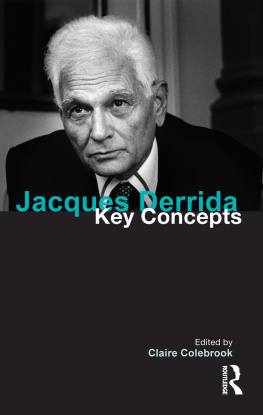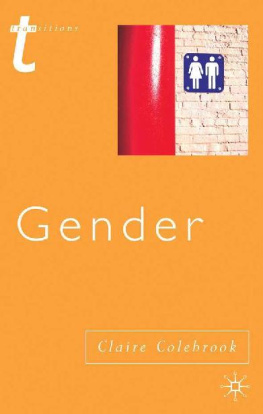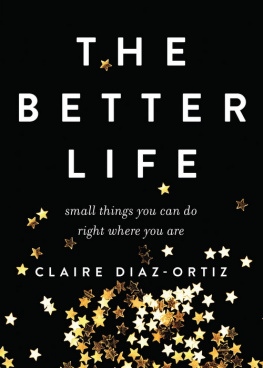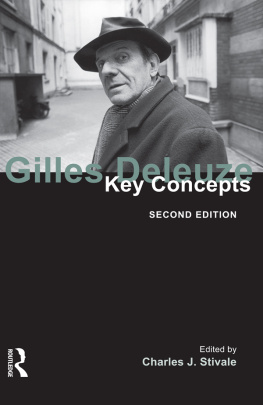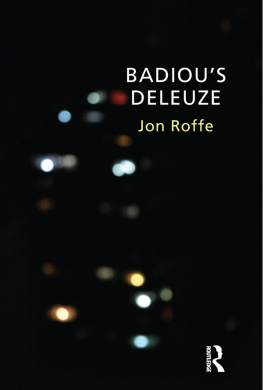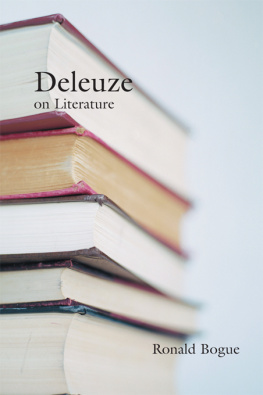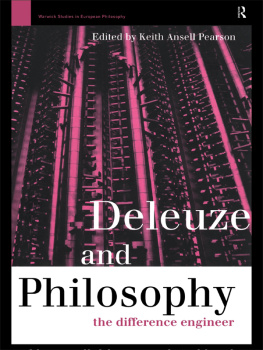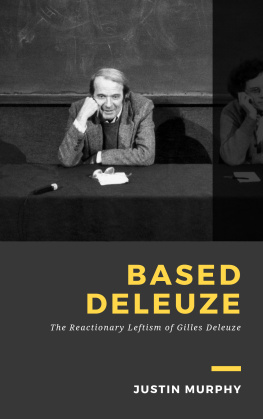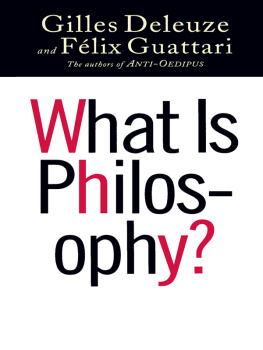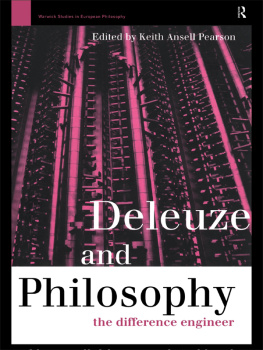Claire Colebrook - Deleuze and the Meaning of Life
Here you can read online Claire Colebrook - Deleuze and the Meaning of Life full text of the book (entire story) in english for free. Download pdf and epub, get meaning, cover and reviews about this ebook. year: 2010, publisher: Bloomsbury Academic, genre: Religion. Description of the work, (preface) as well as reviews are available. Best literature library LitArk.com created for fans of good reading and offers a wide selection of genres:
Romance novel
Science fiction
Adventure
Detective
Science
History
Home and family
Prose
Art
Politics
Computer
Non-fiction
Religion
Business
Children
Humor
Choose a favorite category and find really read worthwhile books. Enjoy immersion in the world of imagination, feel the emotions of the characters or learn something new for yourself, make an fascinating discovery.

- Book:Deleuze and the Meaning of Life
- Author:
- Publisher:Bloomsbury Academic
- Genre:
- Year:2010
- Rating:4 / 5
- Favourites:Add to favourites
- Your mark:
- 80
- 1
- 2
- 3
- 4
- 5
Deleuze and the Meaning of Life: summary, description and annotation
We offer to read an annotation, description, summary or preface (depends on what the author of the book "Deleuze and the Meaning of Life" wrote himself). If you haven't found the necessary information about the book — write in the comments, we will try to find it.
Deleuze and the Meaning of Life — read online for free the complete book (whole text) full work
Below is the text of the book, divided by pages. System saving the place of the last page read, allows you to conveniently read the book "Deleuze and the Meaning of Life" online for free, without having to search again every time where you left off. Put a bookmark, and you can go to the page where you finished reading at any time.
Font size:
Interval:
Bookmark:
Deleuze and the Meaning of Life
Bloomsbury Studies in Continental Philosophy
Series Editor: James Fieser, University of Tennessee at Martin, USA
Bloomsbury Studies in Continental Philosophy is a major monograph series from Bloomsbury. The series features first-class scholarly research monographs across the field of Continental philosophy. Each work makes a major contribution to the field of philosophical research.
Adornos Concept of Life, Alastair Morgan
Badiou, Marion and St Paul, Adam Miller
Being and Number in Heideggers Thought, Michael Roubach
Deleuze and Guattari, Fadi Abou-Rihan
Deleuze and the Genesis of Representation, Joe Hughes
Deleuze and the Unconscious, Christian Kerslake
Deleuze, Guattari and the Production of the New, edited by Simon OSullivan and Stephen Zepke
Derrida, Simon Morgan Wortham
Derrida and Disinterest, Sean Gaston
The Domestication of Derrida, Lorenzo Fabbri
Encountering Derrida, edited by Simon Morgan Wortham and Allison Weiner
Foucaults Heidegger, Timothy Rayner
Gadamer and the Question of the Divine, Walter Lammi
Heidegger and a Metaphysics of Feeling, Sharin N. Elkholy
Heidegger and Aristotle, Michael Bowler
Heidegger and Philosophical Atheology, Peter S. Dillard
Heidegger Beyond Deconstruction, Michael Lewis
Heidegger, Politics and Climate Change, Ruth Irwin
Heideggers Contributions to Philosophy, Jason Powell
Heideggers Early Philosophy, James Luchte
Levinas and Camus, Tal Sessler
Merleau-Pontys Phenomenology, Kirk M. Besmer
Nietzsche, Nihilism and the Philosophy of the Future, edited by Jeffrey Metzger
Nietzsches Ethical Theory, Craig Dove
Nietzsches Thus Spoke Zarathustra, edited by James Luchte
The Philosophy of Exaggeration, Alexander Garcia Dttmann
Sartres Phenomenology, David Reisman
Time and Becoming in Nietzsches Thought, Robin Small
Whos Afraid of Deleuze and Guattari?, Gregg Lambert
iek and Heidegger, Thomas Brockelman
Claire Colebrook

Bloomsbury Academic
An imprint of Bloomsbury Publishing Plc
50 Bedford Square | 1385 Broadway |
London | New York |
WC1B 3DP | NY 10018 |
UK | USA |
www.bloomsbury.com
Bloomsbury is a registered trade mark of Bloomsbury Publishing Plc
Claire Colebrook, 2010
Claire Colebrook has asserted her right under the Copyright,
Designs and Patents Act, 1988, to be identified as Author of this work.
All rights reserved. No part of this publication may be reproduced or transmitted in any form or by any means, electronic or mechanical, including photocopying, recording, or any information storage or retrieval system, without prior permission in writing from the publishers.
No responsibility for loss caused to any individual or organization acting on or refraining from action as a result of the material in this publication can be accepted by Bloomsbury or the author.
British Library Cataloguing-in-Publication Data
A catalogue record for this book is available from the British Library.
ISBN: HB: 978-0-8264-9111-4
PB: 978-1-4411-5240-4
ePUB: 978-1-4411-2115-8
ePDF: 978-1-4411-5428-6
Library of Congress Cataloging-in-Publication Data
A catalog record for this book is available from the Library of Congress
The Problem of Vitalism: Active/Passive
Vitalism in its narrow sense might be identified with a handful of relatively recent names: Henri Bergson, Raymond Ruyer, William James; and a broader tendency in twentieth-century thought to criticize the ways in which systems, such as language or logic, have their origin in animating life but then come to operate independently of the thought and sense that is their condition of emergence. This modern version of vitalism would be a re-articulation and complication of an age-old problem of the relation between praxis and techne, between a living body whose movement furthers its own life, and a perverse extension of those technical movements into systems that ought to be enhancing but that may also develop an alienating, monstrous and autonomous life of their own. Vitalism is at once the most recent of problems, concerned with how we explain lifes capacity not to flourish, not to maximize its potential, and also an essentially regressive problem: for the very concept of a life that might fall into alienation threatens to take a whole series of developments and technologies and place them as secondary or parasitic to an original and generating fecundity that we regard as belied or lost by technical extensions. Such technical extensions and alienations need not be confined to the relation between man and machine but are often diagnosed within man himself. Vitalism is not just the problem of the human beings relation to life (whether or not he is alienated from the order of the living), for it also concerns the structure of the human being itself and the relation among its powers.
Henri Bergson criticized the intellects capacity to manage the world through concepts that reduce difference for the sake of efficiency, a capacity that then becomes life-denying when the intellect turns these necessary reifying manoeuvres on itself (Bergson 1931). William James, similarly, thought that concepts were originally formed to further our living being but could, once they fell into unthinking over-use, become deadening structures that precluded us from feeling life in its complex intensity:
No abstract concept can be a valid substitute for concrete reality except with reference to a particular interest in the conceiver. The interest of theoretic rationality, the relief of identification, is but one of a thousand purposes. When others rear their heads, it must pack up its little bundle and retire till its turn recurs. (James 1896, 70)
Raymond Ruyer, reacting against cybernetics and other forms of mechanistic determination of the living being, insisted on the distinction between the logic we impose on an event after its completion, and the original orientation which might have taken any number of paths precisely because it was not ordered from one part to another but operates with a meaningful sense of the whole (Ruyer 1954). James, Ruyer and Bergson did not simply advocate a return to living origins and a retreat from all forms of articulation; on the contrary, they were all concerned with the ways in which a short-term attention to speed developing techne for efficiency would ultimately lead to an absence of any real future. It is because the organism wishes to master itself and its world to move quickly through its world without stalling to consider all the complexities and differences that it will develop concepts and means for speeding up motion, even if these same concepts will ultimately render it close to immobile:
Our reason, incorrigibly presumptuous, imagines itself possessed, by right of birth or by right of conquest, innate or acquired, of all the essential elements of the knowledge of truth. Even where it confesses that it does not know the object presented to it, it believes that its ignorance consists only in not knowing which one of its time-honoured categories suits the new object. In what drawer, ready to open, shall we put it? In what garment, already cut, shall we clothe it? Is it this, or that, or the other thing? And this, and that, and the other thing are always already something already conceived, already known. The idea that for a new object we might have to create a new concept, perhaps a new method of thinking, is deeply repugnant to us. The history of philosophy is there, however, and shows us the eternal conflict of systems, the impossibility of satisfactorily getting the real into the ready-made garments of our ready-made concepts, the necessity of making to measure. But, rather than go to this extremity, our reason prefers to announce once for all, with a proud modesty, that it has to do only with the relative, and that the absolute is not in its province. This preliminary declaration enables it to apply its habitual method of thought without any scruple, and thus under pretense that it does not touch the absolute, to make absolute judgments upon everything this belief is natural to the human intellect, always engaged as it is in determining under what former heading it shall catalogue any new object; and it may be said that, in a certain sense, we are all born Platonists. (Bergson 1913, 489)
Next pageFont size:
Interval:
Bookmark:
Similar books «Deleuze and the Meaning of Life»
Look at similar books to Deleuze and the Meaning of Life. We have selected literature similar in name and meaning in the hope of providing readers with more options to find new, interesting, not yet read works.
Discussion, reviews of the book Deleuze and the Meaning of Life and just readers' own opinions. Leave your comments, write what you think about the work, its meaning or the main characters. Specify what exactly you liked and what you didn't like, and why you think so.

